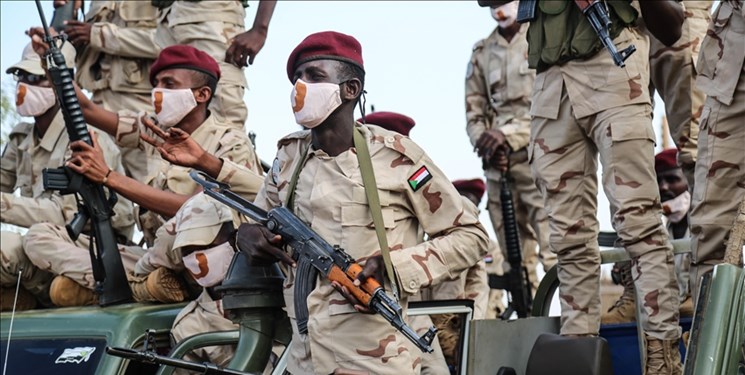Jafar Qanadbashi, speaking in an interview with the website of the Strategic Council on Foreign Relations, said: Analysts have a different view of what happened in Sudan and was mentioned within the framework of a coup, and have presented different analyses. Some analysts see the coup as the result of the new US policies in North Africa, while others see it as the result of rivalries between Saudi-backed groups and the groups affiliated to Muslim Brotherhood.
He added: It seems that such analysis not only cannot analyze the reality of such Sudanese military movement which is called the coup, but also distract the minds from the realities in that country.
According to the expert, the main root of such measure in Sudan, which took place in two stages over a month as a failed and then a successful coup, must be sought in the severe public discontent and the inability of the Sudanese military in reducing and putting an end to such unrest.
He stressed: In other words, the Sudanese military, led by General Abdel Fattah al-Burhan, tried by launching a settlement in the government structure and subsequently securing the atmosphere in Sudan, to dissuade the Sudanese people from continuing the protests and, in other words, to passively subvert anti-military movements.
Commenting on the role of the United States in such developments, Qanadbashi said: It was, in fact, a ploy by the US special envoy to Khartoum to support the move by Sudanese Prime Minister General Abdel Fattah al-Burhan to oust the civilian part of the government. From the point of view of the United States, the Zionist regime and Saudi Arabia, this move was considered as the only way to stop anti-government activities in Sudan and the only way for the military to overcome the wave of public opposition in that country.
The expert, saying that such coup-like move, which does not fit either of the definitions of a coup, continued: The military has so far failed to achieve any of its targets, despite bringing the situation in Sudan under security control and the repressive operations that have led to the killing and injuring scores of the protesters. However, most political parties and groups in Sudan, as well as most trade unions in the country, have not only continued their opposition to the continuation of the al-Burhan rule, but have rejected any conciliatory talks with the military government and called for the immediate resignation of the military leader.
Noting that the Sudanese military tried to limit demands of the people to the return of politicians to power and the return of ousted Prime Minister Abdalla Hamdok, Qanadbashi added: On this basis, they made promises that the Sudanese politicians would be present again alongside the military. But this military tactic played no role in calming the situation and ending the nationwide demonstrations and protests. The Sudanese Trade Union, on the one hand, and the largest Sudanese parties, on the other hand, issued various announcements and statements emphasizing the need to continue the opposition to the military and proposed different plans for the formation of a public-elected government.
As for the roots of the events, he said: Such protests and oppositions not only stem from the inefficiency of the military in continuing affairs, especially the provision of a minimum livelihood for the public in Sudan, but also largely are related to the military’s deplorable foreign policy adopted towards the Zionist regime, Saudi Arabia and the United States.
He added: In the meantime, we should refer to the public hatred of the Sudanese people for the Wahhabi currents related to Saudi Arabia on the one hand, and their pessimism and strong opposition to any normalization of relations with the Zionist regime on the other hand.
According to the expert on African affairs, from the point of view of the Sudanese people, General Al-Burhan is accused of sending Sudanese troops to Yemen even in support of Saudi aggression in Yemen during Omar al-Bashir’s term and from this perspective, he has been supported by Saudi Arabia and the UAE from the beginning of his rise to power in Sudan.
Emphasizing that normalization of Khartoum-Tel Aviv relations, as well as Al-Burhan’s secret contacts with officials of that regime and the suspicious visits of his deputy, is an unforgivable crime in the eyes of the Sudanese people, which calls into question the competence of these two people at the top power of the country, he added: According to the Sudanese people, those two people and other military affiliated with them, with such tendency and close ties with the Zionist regime, would be placed among the traitors to the country.
Regarding the role of Saudi Arabia and the UAE in the recent coup in Sudan, Qanadbashi said: During the recent coup, in addition to the United States, Saudi Arabia and the UAE also took many measures, including sending money to the Sudanese party leaders to prevent the overthrow of the military government; attempts that have so far yielded no clear results.
As for the prospect ahead, he stressed: On this basis, it is said that the insistence of the military and their supporters to remain in power, on the one hand, and insistence of the people on the need for the military to withdraw, on the other hand, has plunged Sudan into a dark and ambiguous corridor which paints a vague picture for this country. Also, despite continuation of mediation efforts and secret talks, there is no opening for Sudan to pass through this difficult stage at the moment.










0 Comments